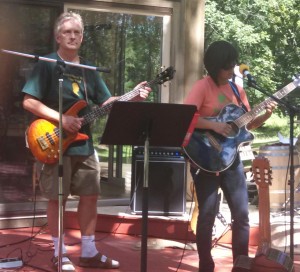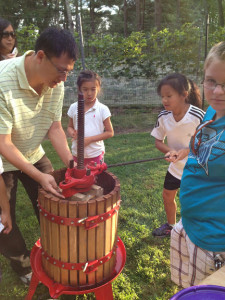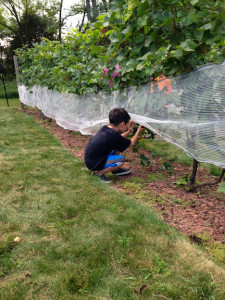A United Methodist Church prayer on Labor Day:
Blessed are you who seek work but have not found it,
And those whose now is not yet what it may be. . .

All Are Welcome
A United Methodist Church prayer on Labor Day:
Blessed are you who seek work but have not found it,
And those whose now is not yet what it may be. . .
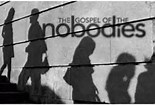
End of summer — and Rev. Catherine Williams will preach the last sermon in the series of the Gospel of the Nobodies on “Labor Day Sunday.” It’s also the last Sunday to join the pick-up choir (come at 9 a.m.). An infant nursery is available, and children will remain with their parents for this family service. Activity bags are available in the narthex.
It is also the “first Sunday,” which means that there will be Holy Communion. This Sunday, it will be by intinction (walk up the aisle, receive the bread, and dip the bread into the cup.) All who believe in the saving grace of Jesus Christ may partake — and you don’t need to be a member of any church.
It is our custom for the pastors to serve Holy Communion to the residents of Stonebridge on the Monday after “first Sundays.” But because that would be Labor Day, Stonebridge residents will receive Communion on the following Monday, September 28. All are welcome here as well.
Let the fall season begin!
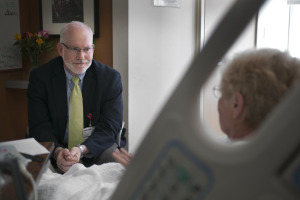 Many of life’s critical moments take place in a healthcare setting. For most of us the bookends of our lives – birth and death – take place with the support of a medical team outside the home. With more attention now on patient-centered care, other healthcare team providers are being recognized for the roles they play at these crucial times.
Many of life’s critical moments take place in a healthcare setting. For most of us the bookends of our lives – birth and death – take place with the support of a medical team outside the home. With more attention now on patient-centered care, other healthcare team providers are being recognized for the roles they play at these crucial times.
An important, but sometimes overlooked or neglected, component of the healthcare team is the pastoral care provider. Chaplain Tedford J. Taylor, director of pastoral care & training at RWJ University Hospital Hamilton, will speak at the UMM breakfast on January 11 on how chaplains and others can offer pastoral companionship and support during these critical times.
Ted supervises more than 20 volunteer and intern chaplains in providing spiritual and emotional care to patients. A diplomate in pastoral supervision through the College of Pastoral Supervision & Psychotherapy (CPSP), he is also board certified as a clinical chaplain with a fellowship in palliative care and hospice through CPSP. He received his Master of Divinity degree from Baptist Theological Seminary. Ted lives with his husband Kevin in Ewing Township and is a Recorded Minister in the Religious Society of Friends (Quakers) and is active in the Yardley Monthly Meeting.
The delicious hot breakfast begins at 8 AM, followed by the program at 8:30. A $5 donation for the meal is requested. Please RSVP to umm@princetonumc.org or 609-924-2613 by noon on Friday, January 9. Everyone is welcome!
For too long, the voice of people of faith has been hidden, drowned out or altogether silent in the public media. This course is designed to help you reclaim your own voice in order to speak faith to a world desperately in need of the good news of God’s love by using the communications tools of the 21st century. Next class begins on November 5, 2014 and costs $29. PUMC can help with the cost. Find out more here.
By the end of this course, you will be able to:
This online course allows learners to complete the 6-week schedule at their own pace, at their convenience.
In the course, you will
Claim — or reclaim your voice to share the Good News!
Here is a video — an inspiring message from Doug about Tithe Sunday.
 Elisa Neira, Princeton’s director of human services, will speak at the United Methodist Men’s breakfast on Sunday, April 13, at 8 a.m. in our newly renovated Fellowship Hall.
Elisa Neira, Princeton’s director of human services, will speak at the United Methodist Men’s breakfast on Sunday, April 13, at 8 a.m. in our newly renovated Fellowship Hall.
Elisa has an impressive resume, having worked with the Latino immigrant community in New Brunswick and with the New Jersey Association of the Deaf/Blind. In addition to being fluent in English and Spanish, she speaks sign language and has some French. She has a BS in social work from Rutgers and an MSW from Fordham.
Hunger is one of the important issues she is working on at the Department of Human Services. Some of her clients are still going hungry, she has said, though they are using all available services. She is also concerned with immigration issues, such as stopping wage theft and tuition equality.
A $5 donation will be accepted for the outstanding hot breakfast.
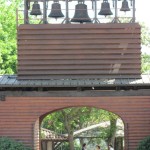
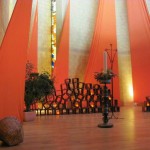
Cathie Capp gave the Lenten meditation on Tuesday, April 8, noon to 12:30 p.m. In the “A Quiet Center” series, her theme was prayer in the Taize’ community. The Taize’ community is known for meditative prayer with neither a beginning nor an end.
 Following this moving and prayerful service, held in the chapel at Princeton United Methodist Church, there was a light lunch, provided by Iona Harding.
Following this moving and prayerful service, held in the chapel at Princeton United Methodist Church, there was a light lunch, provided by Iona Harding.
Cathie t00k these photos during the week that she spent in the Taize community.
 There was a man who spent his days at the homeless shelter in the heart of a city serving meals to those who came to seek shelter. He not only served the food, but also liked to move through the cafeteria and strike up conversations with the guests while they ate.
There was a man who spent his days at the homeless shelter in the heart of a city serving meals to those who came to seek shelter. He not only served the food, but also liked to move through the cafeteria and strike up conversations with the guests while they ate.
One day, the man sat down beside a woman he had never seen before and began to speak with her. The woman immediately felt very comfortable with the man and opened up to him about her life and the terrible state in which she currently found herself. The man listened very intently to what she was saying and offered no judgement, only a sympathetic ear.
After the mealtime was over, the woman made her way to the door and thanked the man for listening. The man smiled and invited her to come back whenever she was in need. So, for the next three days, the woman came back to the shelter, enjoyed a hot meal and a nice conversation with the man.
On the evening of that fourth day, the man discovered that his wallet was missing. He tried to retrace his steps from the day, but could not recall where he had last seen it. He reported the loss to the supervisor of the shelter, and all but gave up on the idea that he would ever see it recovered.
The next morning, the supervisor called the man into his office. When the man entered, he saw, sitting in one of the two chairs beside the supervisor’s desk, the woman whom he had befriended at the beginning of the week.
“Well, hello,” said the man. “What brings you in here and at this time of day.”
The supervisor sat behind his desk and let the woman speak up for herself.
“I’m here because I felt terrible, ” she confessed.
“Whatever for?” asked the man, sitting down next to her in the other chair.
“I stole your wallet yesterday afternoon while we were sitting together at lunch. You laid it down on the table, and while we were talking, I took it and put it in my coat. You never even noticed.”
“Ok,” said the man, surprised at the honest confession. “So, what brought you back?”
“After I had gotten away clean, I started to think about how easy it had been to lift the wallet from you. I realized that the reason it was so simple was that you didn’t notice because you were listening to me so intently. I had never had anyone so interested in what I had to say before. I knew then that I could never live with myself if I kept it, so I brought it back to your supervisor. I’m very sorry.”
The supervisor looked at the woman and then said to the man, “I’m not surprised at all, you know. I knew this would happen to you. You never pay close enough attention to what the guests are doing. You’re too wrapped up in what they’re saying to guard against theft. What am I going to do with you?”
“You’re right,” said the man. “I’m surprised it’s taken this long.” Then, looking forgivingly at the woman, he said, “Thank you for returning my wallet to me, and I accept your apology. I hope you will stay and enjoy another meal with us today.”
“I’d love to stay, but please don’t fire this man,” pleaded the woman to the supervisor. “Who would ever listen to me like he does?”
“Fire him?” asked the supervisor, surprised by the very notion. “I wish I had 50 more employees like him! People try to steal things from our staff all the time, but never once has anyone gotten away with it and come back to return what they’ve taken. Besides, if I fire him, who would ever listen to me like he does?”
 Sacrament. I love the word–it’s fun to say…
Sacrament. I love the word–it’s fun to say…
More than that, however, I love what it means.
A Sacrament is essentially anything finite through which The Sacred (or God or The Spirit) becomes present to us. So, while the sacraments with which we may be most familiar- Holy Communion, Baptism, etc.- certainly function in this way, there is also room for, and a need to acknowledge, the validity of experiences of God in our everyday lives by anyone and everyone who is open to such experiences.
A long run (if you’re a runner like me), or an especially wonderful yoga class, or watching your children play on their own, or a brilliant time with friends (please insert your own finite thing or activity here_____) can all be sacramental in their function if we are open to that possibility.
Recently, just after a long run, as it would happen, I happened upon a brilliant performance of an Antonio Scarlatti piano sonata played by Vladimir Horowitz on my iPhone. I had it set for a post-run shuffle, and as I walked to cool down, the piece began to play.
I let the solo piano flow through my ear-buds as I walked along the sidewalk on my way back to my front door. I was completely transported. For five minutes, I was dreaming, imagining, immersed in listening, and baptized in the connectedness of an audience (me), a performer (Horowitz), and a composer (Scarlatti). We were connected in a profound way by something much greater than any single one of us in this transaction.
The art of music was a sacrament for me in that moment. Scarlatti’s piano sonata re-awakened me to the very presence of God. I knew God was present with me at that moment and was honored to be reminded of that fact.
And that’s one of the things that sacrament can do–remind us of the very presence of God.
I was reminded of how valuable and important I am to the Spirit and felt an unexplainable notion that I was being given a very special gift in that moment. The feeling that filled me next was one of complete gratitude. I was so grateful to have been able to experience such beauty and connectedness.
I never, for one moment, felt like God was giving me something so that he could charge me with doing something else. I never felt as though God was saying, “You want more of this? Then do more of that!” I just felt that I was being given a gift, a sacramental moment, a “thin place” as the Celtic Christians used to say.
I think the only thing required of me was that I was open to receiving this gift. Period. What I did with it afterward was my business.
I want to be in the business of being a part of as many of these moments as I can for the rest of my life and rejoicing with others when they can do the same.
I wish you peace and joy!
-Scott Langdon
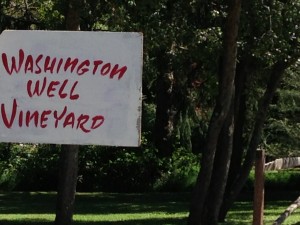
The Andrew Hayes family hosted their second annual fall harvest picnic at Washington Well Vineyard on September 7. More than 200 people — one third of them were children — enjoyed the music, food, and good times. A favorite was the grape stomping! At one point the hosts, Andrew and his multi-talented wife, Jie Hayes of Songbird Capital, took the stage (below). More than $400 was raised for UFAR to combat riverblindness, and the children — enamored with a shelter puppy who graced the occasion– collected contributions for SAVE. (The puppy has been added to the vineyard’s livestock!) It was a warm and wonderful afternoon.
